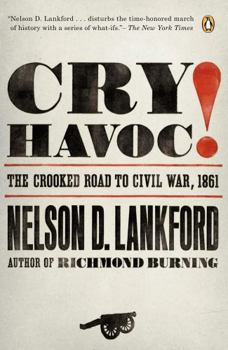Cry Havoc!: The Crooked Road to Civil War, 1861
Select Format
Select Condition 
Book Overview
A "compact, engrossing narrative"* that vividly reimagines the events that led to the outbreak of the Civil War What separates historian Nelson D. Lankford's engaging examination of the causes of the Civil War from other books on the subject is its willingness to consider the alternative possibilities to history. Cry Havoc recounts in riveting detail the small quirks of timing, character, and place that influenced the huge trajectory...
Format:Paperback
Language:English
ISBN:0143112791
ISBN13:9780143112792
Release Date:December 2007
Publisher:Penguin Publishing Group
Length:336 Pages
Weight:0.70 lbs.
Dimensions:0.7" x 5.5" x 8.4"
Age Range:18 years and up
Grade Range:Postsecondary and higher
Customer Reviews
2 ratings
Interesting Treatment of a Very Limited Period -- Probably not for the General Reader
Published by Thriftbooks.com User , 15 years ago
Author Lankford has written an extremely interesting thesis covering the period from Lincoln's inauguration on March 4, 1861 to May 27th. He treats the South as having two distinct groupings; the lower South of seven states that formed the Confederacy in Montgomery, Alabama prior to Lincoln's taking office (South Carolina, Florida, Georgia, Alabama, Mississippi, Louisiana and Texas) and the upper South of Maryland, Virginia, North Carolina, Tennessee, Kentucky, Arkansas, Missouri and Delaware. Even with the lower South already in secession and South Carolina besieging Fort Sumpter Lincoln was faced with many possible courses of action, particularly since there was substantial union sentiment in the upper South that was opposed to secession if some compromise could be reached on slavery and if Lincoln could be accommodating. Historians today tend to dismiss the unionists in the upper South as naive since their cause proved to be futile in the face of Lincoln's intransigence, but it did not look hopeless at the time. After all, compromises had been made over slavery a number of times in the past, and as we know in modern times, presidential candidates often say things while campaigning that they repudiate when in office. Lincoln, however, was no modern politician. In the upper South prior to Lincoln's inauguration, secession was soundly defeated in Arkansas, Virginia and Missouri, somewhat narrowly in North Carolina, and Tennessee voters overwhelming voted down even the formation of a convention to consider secession. The trick would be to hold those states in the Union, but as it turned out, any military action against the seven states in secession would turn all but Missouri, West Virginia, Maryland, Delaware, and the non-slave holding areas of West Virginia, East Tennessee, Northern Arkansas and Northern Alabama firmly against the Union. Significant efforts were made to find a compromise, even by Seward who attempted to undermine Lincoln, but all were probably doomed when Lincoln decided to resupply Fort Sumpter. The hotheads in South Carolina took Lincoln's action as a provocation and reacted with a much more serious provocation -- firing on Fort Sumpter. Still the upper South hesitated to see what would happen. If Lincoln allowed this provocation to go unanswered and appeased the lower South, peace was still possible even at that late date. Certainly modern politicians would give such appeasement great consideration. But Lincoln reacted to the Fort Sumpter attack in the only way he could to avoid massive problems in the North -- he issued a call for all loyal states, including those of the upper South, to activate their militias and supply 75,000 soldiers for three months service. He based his authority on the 1795 militia act, a law totally forgotten by anti-gun activitists in contemporary times. Of the 94 regiments requested, 21 were to come from the upper South. This proclamation put the fat into the fire
All sorts of interesting tidbits
Published by Thriftbooks.com User , 16 years ago
Unlike prior reviewers, I actually found this book to be full of many interesting facts. I am not a Civil War scholar, but consider myself generally knowledgable on the subject, and did extract from this book a number of unique perspectives and facts that are not typically portrayed in other general civil war texts. Although the author draws some conclusions that perhaps are not "mainstream", he does so intelligently. He also does not seem to "force" any opinions onto the reader, but instead leaves ample opportunities for the reader to draw his/her own conclusions, and, of note, by way of many fairly unique and not-often presented facts. Unlike one of the reviewers who feels the author's use of original articles and speeches in the book is excessive, I actually found the inclusion of these items to be a positive feature. It was refreshing to be able to read the actual text of noteworthy speeches instead of reading someone else's summary and interpretation of a speech. In short, the Civil War is a topic that has many facets, and this book presents information about the events leading up to the War in a unique and thorough way. I do not believe the author intended the book to be an exhaustive reference guide to the Civil War; instead, he has presented certain aspects of a topic which has been written about 1000's of times, in an intelligent, well-researched, and interesting way. The true Civil War buff will enjoy it, and even the casual "learner" will find much to take away from this book.






